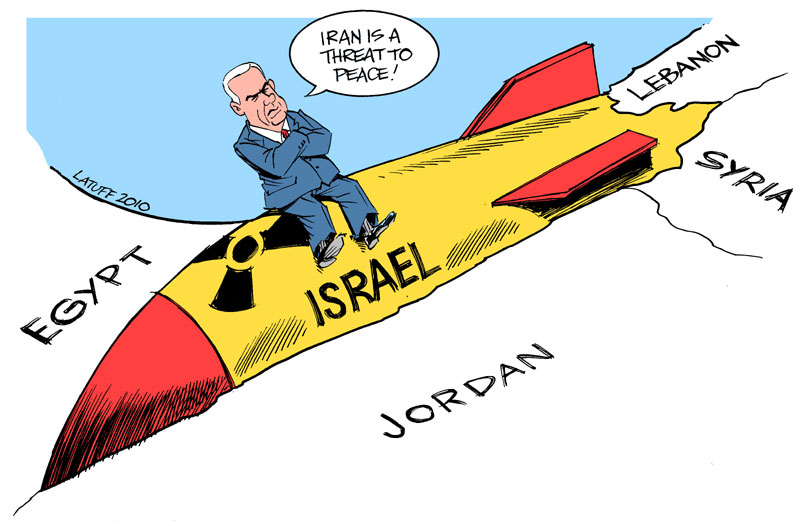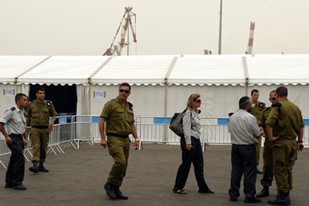EDITOR: Russel Tribunal on Palestine report is out
This important international report is now out, after the lengthy procedure which has been used to collect, corroborate and edit it. As the report itself is exceedingly long, I have only provided here the bottom line conclusions. I strongly suggest reading this report if you wish to come into contact with the frightening and grim realities of the Israeli occupation and its iniquities, as put by the most authoritative international body to date.
To read the report and its three Annexes, use the link below:
Russell Tribunal on Palestine: 2010 Report
VII. TRIBUNAL CONCLUSIONS
7.1 The Tribunal heard compelling evidence of corporate complicity in Israeli violations of international law, relating to: the supply of arms; the construction and maintenance of the illegal separation Wall; and in establishing, maintaining and providing services, especially financial, to illegal settlements, all of which have occurred in the context of an illegal occupation of Palestinian territory. On the basis of this evidence, the Tribunal draws the following conclusions.
7.2 The RToP reiterates that Israel committed serious breaches of IHL during the Gaza incursion (December 2008-January 2009), especially by launching attacks that, in terms of the damage inflicted on the civilian population, are sufficient in themselves to demonstrate their indiscriminate and disproportionate nature. These breaches constitute war crimes entailing the criminal responsibility of their perpetrators. Corporations provided Israel with weapons and military equipment that assisted it in committing these crimes. The supply of such equipment involves acts of assistance that constitute complicity in Israel‟s violation of international law.
7.3 The RToP reiterates that the establishment and maintenance of settlements in the occupied Palestinian territories are violations of international humanitarian law and regulatory entail the commission of war crimes by Israel. Corporations assist in the establishment of such settlements by supplying equipment that can be used to demolish dwellings, to destroy Palestinian land and to build property. They also contribute to the maintenance of the settlements through the economic relations that they forge with the settlements; for example, by financing the construction of property, by investing in business firms established in the settlements, by importing goods produced by the settlements and by providing them with commercial services. These corporations are complicit in Israel‟s violations of international law, including war crimes.
7.4 The RToP reiterates that the construction by Israel, inside the occupied territories, of a separation Wall between Israel and the rest of the territories violates a number of international legal rules by seriously restricting, without legal justification, the exercise of certain civil, economic, social and cultural rights by the affected Palestinian population. Corporations assist Israel in its violations of international law
51
by providing Israel with cement, equipment and vehicles that are used in the construction and maintenance of the Wall.
7.5 With regards to the legal liability of corporations assisting Israel in the violation of international law, the Tribunal concludes as follows.
7.6 By assisting Israel, corporations have infringed the rights recognized by state obligations. Corporations may be liable under civil or criminal law (for example, money laundering and/or handling or receiving stolen goods) for infringing these rights in domestic law courts (many countries domestic law incorporates international law, including international humanitarian and human rights law). For example:
(a) A claim for damages against a corporation that provided goods and services that they knew (or should have known) would be used in a manner that would cause the claimant (or a class to which the claimant belonged) damage/loss, particularly personal injury, may succeed under domestic tort law (e.g. in England and Wales or the United States) where it can be shown that damage was caused. The fact that the acts were those of the defendant‟s subsidiary need not be a bar to recovery.
(b) Palestinians may bring a suit under the ATCA for aiding and abetting war crimes and/or crimes against humanity.
(c) A prosecution may be brought against a corporation in the French, English or American jurisdictions, although the prosecution is likely to be for a crime within each jurisdiction rather than simply for „violations of international law‟.
(d) The Special Representative‟s Guidelines, the Global Compact, the Norms and the OECD Guidelines all specify that corporations should refrain from violating and should actively promote human rights norms and principles.
(e) Pursuant to Article 121-7 of the French Criminal Code, it may be possible to bring a claim against corporations operating on French territory that provide material support to the construction of the Wall.
52
(f) Because war crimes are criminal offences under US domestic law and aiding and abetting is criminalised under US law, a corporation could be prosecuted in the US for aiding and abetting war crimes committed overseas. U.S. war crimes statutes approve the exercise of extraterritorial jurisdiction to prosecute grave breaches of international criminal law by and against U.S. nationals.
7.7 The Tribunal concludes that corporate actors may be liable under international criminal law and/or under domestic criminal law if they have taken decisions as a result of which corporations have become involved in assisting Israel‟s violations of international law. They may also be liable under civil law, in particular, under the Alien Tort Statute in the United States, which provides a tort remedy for serious violations of international law.
7.8 With regards to the non-legal liability of corporations, the Tribunal concludes that claims may be submitted to OECD National Contact Points for mediation and/or investigation and a final statement. The Tribunal recommends that a claim be brought before a domestic NCP where one is available for the state in which the corporation is domiciled. If no such NCP exists, corporations should be brought before an NCP in other states in which they have a permanent presence.
7.9 Representations to public bodies should make it clear that continued economic relations with these corporations would be contrary to their voluntary codes of conduct/guidance and to their government‟s obligations to promote and protect human rights. Continued economic relations may give rise to state responsibility.
7.10 States are advised to follow the example set by the Dutch public bodies that have investigated a Dutch corporation alleged to be complicit in in violation of international human rights and humanitarian law by supplying materials to Israel for the construction and maintenance of the illegal Wall.
7.11 The Tribunal concludes that states have an obligation to enforce existing law against corporations where they are acting in violation of international human rights and humanitarian law standards.
53
7.12 States should ensure that there are sufficient remedies available, and that these remedies are accessible to victims of corporate violations of international and domestic law.
7.13 Finally, the Tribunal calls upon individuals, groups and organizations to take all necessary measures to secure compliance of corporations with international human rights and humanitarian law standards, in particular: boycotting corporations that assist in violations of international law, shareholders holding corporations to account, divestments by pension funds of investments tainted by illegality, and actions that continue to put corporations in the spotlight with the purpose of bringing about change in corporate culture. The Tribunal finds legal support for these initiatives in the Opinion of the International Court of Justice on the Wall, in which the Court stated that there exists an erga omnes obligation to refrain from recognizing or in any way supporting the illegality that arises from the conduct of Israel by building the Wall and violating international humanitarian law.
EDITOR: Beware of Israeli deception!
In its growing concern about the effects of BDS, Israel has now resorted to plain deception. The package below is advertising an oxymoron: Palestinian product sold by Israel’s offcial exporter, Agrexco. Beware and warn others of this new con! Nowhere on this package is the word Israel mentioned!
EU LAYS BASIS FOR SANCTIONS AGAINST ISRAEL: TikunOlam
In late Apartheid-era South Africa, the momentum among the international community shifted inexorably toward toppling the discriminatory system. Crippling sanctions took their toll on the country’s economy and psyche. While the white regime clung desperately to power, finally a spark of realism emerged within the ruling party which allowed the rise of a leader like F.W. de Klerk, who negotiated a peaceful transition to democracy and majority rule.
In the past few months, a similar process has emerged outside Israel with multiple Latin American nations (the latest being Chile) recognizing a Palestinian state within 1967 borders. Now, Haaretz reports on a sensitive new EU report drafted by consuls general in Jerusalem and Ramallah which would lay the groundwork for a possible EU sanctions regime against Israel as long as it continues the Occupation and rejects a Palestinian state.
Among the recommendations:
1. a boycott of all Israeli products, services and businesses operating outside the Green Line including East Jerusalem
2. refusal to attend meetings with Israeli officials outside the Green Line (including East Jerusalem)
3. creating a settler black list forbidding entry to EU countries of those suspected of committing violent acts against Palestinians
4. discouraging citizens of EU countries (most likely directed at European Jews) from purchasing property in East Jerusalem
Returning to the South African analogy, the chief difference is that there seems to be no realism whatsoever within the Israeli political system nor any moderate or pragmatic leader capable of being the Israeli de Klerk. In that event, it seems that Israel’s future is deeply clouded. Without political leadership, and with the gathering storm of opprobrium against the Occupation and denial of Palestinian national rights, it seems something has to give. It could be an international diktat jointly negotiated by the U.S., EU, and Quartet compelling Israel to yield. Or it could take some other form. But it appears more and more likely that Israel simply cannot come to terms with what it must do and that the rest of the world must help or even force Israel to get where it needs to be so that both that country and the rest of the region can find stability and peace.
The nation is behind you, Galant: Haaretz
The synergy between settlers and soldiers derives from the intimate relationship between defender and defended, and from the basic fact that the IDF is a people’s army.
By Amira Hass
The seizure of public land, unauthorized road paving, misleading testimony, double standards in land allocation – all under the cover of an army uniform. Is this a precis of the history of Israeli colonialism? Not at all. These claims are the basis of the High Court of Justice petition by the Green Movement political party against Yoav Galant’s appointment as the next Israel Defense Forces chief of staff, accusations that Maariv journalist Kalman Liebeskind has made repeatedly in investigative reports over the past two years.
In the meantime, the High Court has asked the attorney general on Monday to explain how complaints lodged against Galant have been handled. Here is an explanation that has already been written, but in invisible ink:
The IDF, the greenhouse that has nurtured Galant, is the major land broker in Palestinian areas that were occupied in 1967. All the land that private speculators have managed to purchase by cunning and stealth does not come close to the vast territory stolen on military orders signed by our finest commanders. The army’s seizure of land “for military and security purposes” quickly turned into large-scale appropriation for the exclusive benefit of Israel’s super-citizens, at the expense of the subpar species.
The IDF is simultaneously the representative and the defender of a campaign to peddle the Bible as a real estate deed. Public land, private land, rocky ground, springs, unregistered land, irrigated land, unirrigated land, built-up land, precious artifacts of agricultural and architectural traditions – it’s all the same. Military and civilian jurists alike, ensconced in the robes of knowledge and boasting degrees conferred by the finest universities, have concocted infinite stratagems and machinations to plunder all types of land.
The jurists and the military commanders, like the soldiers who tack land seizure orders or demolition orders on olive trees, are the representatives, the emissaries, of the campaign. But in a state in which military service constitutes an admissions test for a successful political career, any lines that distinguish between those who devise policy and those who implement it become blurred.
Lest there be a misunderstanding, let me state that the settlers also play the role of emissary. Even when the puppet rises against its maker and protector, it is still an instrument, and it is implementing the consistent policy of undermining the prospect of a viable Palestinian state (as compared to a state of Bantustans, of the sort that Kadima and Labor are advocating.
Generations of soldiers and commanding officers owe to the settlement enterprise their social capital – their prestige – and their livelihood in the army, politics or business. As the settlement enterprise grows, so does the number of Israeli Jews who profit from it, whether directly or indirectly. And as that dual expansion takes place, the dispossession of those who aren’t Israeli Jews also increases, as does the need for more security techniques. Israelis serving in the army – whether recent recruits, career soldiers or reservists – are depicted as altruistic, as having no agenda of their own, as the prime human material behind these security techniques.
The synergy between settlers and soldiers derives from the intimate relationship between defender and defended, and from the basic fact that this is a people’s army. In a state in which the social welfare component has long since become watered down, it is the settlements that have become the best prospect for a socioeconomic upgrade for Israeli Jews.
For Galant, the synergy appears to have gone awry; according to the complaints, his actions were a scaled-down version of what his employer, the IDF, has been doing on a macro level.
If he lived in the West Bank settlement of Ofra and he took over land in the neighboring villages of Silwad and Ein Yabrud – just as he is accused of doing to his Jewish neighbors in Moshav Amikam – those who compile a report or file a complaint about it might be subject to a parliamentary investigation.
It would be pointless to file an altogether different kind of petition: one that protests Galant’s appointment as chief of staff not because of his private actions but because of the direct responsibility that he, as GOC Southern Command, bears for the killing of hundreds of civilians in Gaza during Operation Cast Lead, in non-combat circumstances.
The nation is behind you, Galant.






